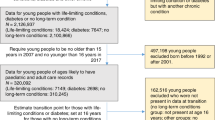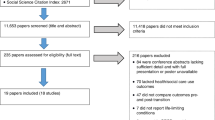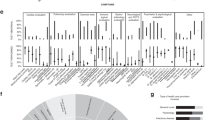Key Points
-
Transition of care is a gradual process in which adolescents learn to assume personal responsibility for their health care, culminating in transfer of care from a paediatric to adult-based model
-
Transition of care will usually begin early in adolescence (age 10–12 years), with final transfer of care occurring most often between 18 and 23 years, although exceptions exist
-
Major barriers to successful transition of care include psychological factors, deficits in self-management skills and system-based factors
-
Failure to successfully transition could lead to compromised emotional and physical health outcomes
-
Structured transitional care programmes facilitate the shift of responsibility from parent to patient, create pathways to transfer records from paediatric to adult providers, and help patients and families navigate access to care
-
Benefits of transitional care tools and initiatives are supported by expert consensus and by studies investigating subjective patient satisfaction-based outcome measurements, but their influence on objective health outcomes warrants further study
Abstract
Transfer of care is when a patient and his or her medical records move from one provider to another at a distinct point in time. By contrast, transition of care is a gradual process of change in knowledge, attitudes and behaviour through which the adolescent can learn to assume personal responsibility for his or her health care. IBD is a prevalent disorder, often diagnosed during childhood. Because mortality of this condition is fortunately low, children diagnosed with IBD will, at some point, transition from a paediatric to adult health-care model. Paediatric and adult health-care paradigms, including IBD-specific care, are different in a number of key areas and it is becoming increasingly apparent that young adults with chronic illness often face challenging transitions, resulting in compromised physical and emotional health outcomes. In the past decade, refining the processes related to transition of care for adolescents with chronic medical conditions has gained traction as an important public health initiative. The aim of this paper is to review concepts pertinent to transition of management for adolescents and young adults with IBD, and to review the current literature and evidence supporting transitional care in paediatric IBD.
This is a preview of subscription content, access via your institution
Access options
Subscribe to this journal
Receive 12 print issues and online access
$209.00 per year
only $17.42 per issue
Buy this article
- Purchase on Springer Link
- Instant access to full article PDF
Prices may be subject to local taxes which are calculated during checkout
Similar content being viewed by others
References
Reiss, J. & Gibson, R. Health care transition: destinations unknown. Pediatrics 110, 1307–1314 (2002).
Centers for Disease Control and Prevention. Inflammatory Bowel Disease (IBD). Centers for Disease Control and Prevention [online], (2012).
Baldassano, R. N. & Piccoli, D. A. Inflammatory bowel disease in pediatric and adolescent patients. Gastroenterol. Clin. North Am. 28, 445–458 (1999).
Malaty, H. M. et al. Rising incidence of inflammatory bowel disease among children: a 12-year study. J. Pediatr. Gastroenterol. Nutr. 50, 27–31 (2010).
Blum, R. W. et al. Transition from child-centered to adult health-care systems for adolescents with chronic conditions. A position paper of the Society for Adolescent Medicine. J. Adolesc. Health 14, 570–576 (1993).
Rosen, D. S. Transition of young people with respiratory diseases to adult health care. Paediatr. Respir. Rev. 5, 124–131 (2004).
Wallis, C. Transition of care in children with chronic disease. BMJ 334, 1231–1232 (2007).
Bennett, D. L., Towns, S. J. & Steinbeck, K. S. Smoothing the transition to adult care. Med. J. Aust. 182, 373–374 (2005).
McDonagh, J. E., Growing up and moving on: transition from pediatric to adult care. Pediatr. Transplant. 9, 364–372 (2005).
Giarelli, E. et al. Adolescents' transition to self-management of a chronic genetic disorder. Qual. Health Res. 18, 441–457 (2008).
Philpott, J. R. Transitional care in inflammatory bowel disease. Gastroenterol. Hepatol. (NY) 7, 26–32 (2011).
Hait, E., Arnold, J. H. & Fishman, L. N. Educate, communicate, anticipate-practical recommendations for transitioning adolescents with IBD to adult health care. Inflamm. Bowel Dis. 12, 70–73 (2006).
Goodhand, J. et al. Inflammatory bowel disease in young people: the case for transitional clinics. Inflamm. Bowel Dis. 16, 947–952 (2010).
Hartman, C., Eliakim, R. & Shamir, R. Nutritional status and nutritional therapy in inflammatory bowel diseases. World J. Gastroenterol. 15, 2570–2578 (2009).
Markowitz, J. & Daum, F. Growth impairment in pediatric inflammatory bowel disease. Am. J. Gastroenterol. 89, 319–326 (1994).
Desmond, A. N. et al. Crohn's disease: factors associated with exposure to high levels of diagnostic radiation. Gut 57, 1524–1529 (2008).
Gurvitz, M. Z. et al. Changes in hospitalization patterns among patients with congenital heart disease during the transition from adolescence to adulthood. J. Am. Coll. Cardiol. 49, 875–882 (2007).
McManus, M. A. et al. Current status of transition preparation among youth with special needs in the United States. Pediatrics 131, 1090–1097 (2013).
Pinzon, J. L., Jacobson, K. & Reiss, J. Say goodbye and say hello: the transition from pediatric to adult gastroenterology. Can. J. Gastroenterol. 18, 735–742 (2004).
Peterson, P. M. et al. Spina bifida: the transition into adulthood begins in infancy. Rehabil. Nurs. 19, 229–238 (1994).
Mahadevan, U. et al. Pregnancy outcomes in women with inflammatory bowel disease: a large community-based study from Northern California. Gastroenterology 133, 1106–1112 (2007).
Goodhand, J. R. et al. Factors associated with thiopurine non-adherence in patients with inflammatory bowel disease. Aliment. Pharmacol. Ther. 38, 1097–1108 (2013).
Moons, P., Hilderson, D. & Van Deyk, K. Implementation of transition programs can prevent another lost generation of patients with congenital heart disease. Eur. J. Cardiovasc. Nurs. 7, 259–263 (2008).
Van Walleghem, N., Macdonald, C. A. & Dean, H. J. Evaluation of a systems navigator model for transition from pediatric to adult care for young adults with type 1 diabetes. Diabetes Care 31, 1529–1530 (2008).
Nakhla, M. et al. Transition to adult care for youths with diabetes mellitus: findings from a Universal Health Care System. Pediatrics 124, 1134–1141 (2009).
de Beaufort, C. et al. Transition from pediatric to adult diabetes care: smooth or slippery? Pediatr. Diabetes 11, 24–27 (2010).
Tuchman, L. K. et al. Cystic fibrosis and transition to adult medical care. Pediatrics 125, 566–573 (2010).
Busse, F. P. et al. Evaluation of patients' opinion and metabolic control after transfer of young adults with type 1 diabetes from a pediatric diabetes clinic to adult care. Horm. Res. 67, 132–138 (2007).
McCurdy, C. et al. There to here: young adult patients' perceptions of the process of transition from pediatric to adult transplant care. Prog. Transplant. 16, 309–316 (2006).
Moons, P. et al. Expectations and experiences of adolescents with congenital heart disease on being transferred from pediatric cardiology to an adult congenital heart disease program. J. Adolesc. Health 44, 316–322 (2009).
Stabile, L. et al. Transfer versus transition: success in pediatric transplantation brings the welcome challenge of transition. Prog. Transplant. 15, 363–370 (2005).
Clarizia, N. A. et al. Transition to adult health care for adolescents and young adults with congenital heart disease: perspectives of the patient, parent and health care provider. Can. J. Cardiol. 25, e317–e322 (2009).
Stam, H. et al. Young adult patients with a history of pediatric disease: impact on course of life and transition into adulthood. J. Adolesc. Health 39, 4–13 (2006).
Mackner, L. M. & Crandall, W. V. Long-term psychosocial outcomes reported by children and adolescents with inflammatory bowel disease. Am. J. Gastroenterol. 15, 1386–1392 (2005).
Wolman, C. et al. Emotional well-being among adolescents with and without chronic conditions. J. Adolesc. Health 15, 199–204 (1994).
Baldassano, R. et al. Transition of the patient with inflammatory bowel disease from pediatric to adult care: recommendations of the North American Society for Pediatric Gastroenterology, Hepatology and Nutrition. J. Pediatr. Gastroenterol. Nutr. 34, 245–248 (2002).
Department for education and skills. Transition: getting it right for young people. Improving the transition of young people with long term conditions from children's to adult health services. UK Department of Health [online], (2006).
Escher, J. C. Transition from pediatric to adult health care in inflammatory bowel disease. Dig. Dis. 27, 382–386 (2009).
Rosen, D. S. et al. Transition to adult health care for adolescents and young adults with chronic conditions: position paper of the Society for Adolescent Medicine. J. Adolesc. Health 33, 309–311 (2003).
Sebastian, S. et al. The requirements and barriers to successful transition of adolescents with inflammatory bowel disease: differing perceptions from a survey of adult and paediatric gastroenterologists. J. Crohns Colitis 6, 830–844 (2012).
Benchimol, E. I. et al. Assessment of knowledge in adolescents with inflammatory bowel disease using a novel transition tool. Inflamm. Bowel Dis. 17, 1131–1137 (2011).
Fishman, L. N. et al. Self-management of older adolescents with inflammatory bowel disease: a pilot study of behavior and knowledge as prelude to transition. Clin. Pediatr. (Phila) 49, 1129–1133 (2010).
Fishman, L. N. et al. Medication knowledge: an initial step in self-management for youth with inflammatory bowel disease. J. Pediatr. Gastroenterol. Nutr. 53, 641–645 (2011).
Hait, E. J. et al. Transition of adolescents with inflammatory bowel disease from pediatric to adult care: a survey of adult gastroenterologists. J. Pediatr. Gastroenterol. Nutr. 48, 61–65 (2009).
Eaden, J. A., Abrams, K. & Mayberry, J. F. The Crohn's and Colitis Knowledge Score: a test for measuring patient knowledge in inflammatory bowel disease. Am. J. Gastroenterol. 94, 3560–3566 (1999).
Parker, R. M. et al. The test of functional health literacy in adults: a new instrument for measuring patients' literacy skills. J. Gen. Intern. Med. 10, 537–541 (1995).
Huang, J. S., Tobin, A. & Tompane, T. Clinicians poorly assess health literacy-related readiness for transition to adult care in adolescents with inflammatory bowel disease. Clin. Gastroenterol. Hepatol. 10, 626–632 (2012).
Scal, P. et al. Trends in transition from pediatric to adult health care services for young adults with chronic conditions. J. Adolesc. Health 24, 259–264 (1999).
Cohen, R. A. & Bloom, B. Access to and utilization of medical care for young adults ages 20–29 years: United States, 2008. Centers for Disease Control and Prevention [online], (2008).
Callahan, S. T. & Cooper, W. O. Access to health care for young adults with disabling chronic conditions. Arch. Pediatr. Adolesc. Med. 160, 178–182 (2006).
Cooley, W. C. & Sagerman, P. J. Supporting the health care transition from adolescence to adulthood in the medical home. Pediatrics 128, 182–200 (2011).
American Academy of Pediatrics, American Academy of Family Physicians & American College of Physicians-American Society of Internal Medicine. A consensus statement on health care transitions for young adults with special health care needs. Pediatrics 110, 1304–1306 (2002).
Dabadie, A. et al. Transition of patients with inflammatory bowel disease from pediatric to adult care. Gastroenterol. Clin. Biol. 32, 451–459 (2008).
Cole, R. et al. Comparative evaluation of outcomes in adolescents with IBD on transfer from paediatric to adult health care services: a case for structured transition [abstract OC-052]. Gut 61 (Suppl. 2), A23 (2012).
Annunziato, R. A. et al. Transitioning health care responsibility from caregivers to patient: a pilot study aiming to facilitate medication adherence during this process. Pediatr. Transplant. 12, 309–315 (2008).
Shemesh, E. et al. Medication adherence in pediatric and adolescent liver transplant recipients. Pediatrics 113, 825–832 (2004).
Neu, A. et al. Follow-up of adolescents with diabetes after transition from paediatric to adult care: results of a 10-year prospective study. Exp. Clin. Endocrinol. Diabetes 118, 353–355 (2010).
Cadario, F. et al. Transition process of patients with type 1 diabetes (T1DM) from paediatric to the adult health care service: a hospital-based approach. Clin. Endocrinol. (Oxf.) 71, 346–350 (2009).
Holmes-Walker, D. J., Llewellyn, A. C. & Farrell, K. A transition care programme which improves diabetes control and reduces hospital admission rates in young adults with type 1 diabetes aged 15–25 years. Diabet. Med. 24, 764–769 (2007).
McDonagh, J. E., Southwood, T. R. & Shaw, K. L. The impact of a coordinated transitional care programme on adolescents with juvenile idiopathic arthritis. Rheumatology (Oxford) 46, 161–168 (2007).
Litt, I. F., Cuskey, W. R. & Rosenberg, A. Role of self-esteem and autonomy in determining medication compliance among adolescents with juvenile rheumatoid arthritis. Pediatrics 69, 15–17 (1982).
Ferris, M. E. et al. A clinical tool to measure the components of health-care transition from pediatric care to adult care: the UNC TRxANSITION scale. Ren. Fail. 34, 744–753 (2012).
The National Alliance to Advance Adolescent Health. Got Transition? Center for Health Care Transition Improvement [online], (2013).
The Hospital for Sick Children (SickKids). MyHealth Passport [online].
Author information
Authors and Affiliations
Contributions
Both authors contributed equally to all aspects of this manuscript.
Corresponding author
Ethics declarations
Competing interests
The authors declare no competing financial interests.
Rights and permissions
About this article
Cite this article
Zeisler, B., Hyams, J. Transition of management in adolescents with IBD. Nat Rev Gastroenterol Hepatol 11, 109–115 (2014). https://doi.org/10.1038/nrgastro.2013.254
Published:
Issue Date:
DOI: https://doi.org/10.1038/nrgastro.2013.254



